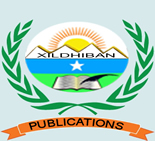|
Xildhiban Publications;- 10 September, 2012. Hassan
Sheikh Mohamud born 29 November 1955 in Jalalaqsi, a small
agricultural town situated in the central Hiiraan region of
Somalia. Mohamud is married and has children. He speaks
Somali and English. He was elected President of Somalia on
10 September 2012. An educator and civic, academic, and
political activist, he was previously a university professor
and dean.
He graduated Somali National University in 1981 and was
employed in the Ministry of education as a teacher / trainer
Lafole Technical Secondary School where He teaches students
and trains artisans.
In 1984, He joined Technical Teachers’ Training College as a
lecturer and in 1986 became head of department before He
traveled to India to attend a master of technical education
program offered by Bhopal University in India.
In 1988 upon his return to Somalia, He was selected as a
counterpart to a group of international experts working on
Upgrading Technical and Vocational Education of Somalia – a
project implemented by UNESCO.
His main area of concentration in the project was
undertaking the research component of the project where He
extensively travelled throughout Somalia. After the collapse
of the Somali state, He worked with UNICEF as education
officer in south and central zone of Somalia in 1993.
This task mainly involved in reviving education sector in
this zone. He travelled extensively in the zone researching
the magnitude of the collapse in the education sector and
consulting the people on how to revive the sector
as a community based endeavour. After the departure of the
UNOSOM in 1995, He mostly involved in civic actions such as
forming pressure groups on the political factions to
reconcile. The main activities engaged were attempting to
open channels of communication between and among the faction
leaders in Mogadishu.
Later on, this became the seed for the formation and
strengthening of the Somali civil society. As a result,
networks, coalitions and professional associations emerged
in Mogadishu one after the other.. After the Cairo agreement
of 1997, He was member of a team that negotiated and
successfully dismantled the GREENLINE that divided Mogadishu
into north and south after the disastrous war of 1992.
In the last part of the 1990s, the conditions of the Somali
youth was very critical. Those graduated from the secondary
schools were having limited opportunities for higher
learning and professional career development.
As a member of ex university lecturers’ forum, we conducted
need assessment survey in the market and identified the
importance of establishing technical and vocational centers
which some of them later on became higher learning centers
such as universities.
As result, he became one of the founders of Somali Institute
of Management and Administration Development (SIMAD) in
1999. It was the first institute of its kind since the
collapse of the Somali state.
The main purpose of SIMAD was to produce mid-level
management and administrative technicians for the post
conflict reconstruction of Somalia. He became the first dean
of the institute until He resigned in 2010.
Currently SIMAD is a leading university in academics,
consultancy, research, and training in Somalia. Close 4,000
student are registered in its undergraduate programs as of
September 2011and more than 1,500 students graduated since
2002 at diploma and bachelor’s degree in various
disciplines.
In 2001, He joined Center for Research and Dialogue (CRD) as
a researcher in post conflict reconstruction of Somalia. He
extensively traveled in south
central Somalia conducting research in the post conflict
reconstruction issues and local peoples’ priorities.
Later on He became a principal researcher. In 2004, CRD
appointed him as a focal point for the issues related to the
civil society strengthening. In consultation with other
prominent civil society members, He worked in establishing
the Mogadishu monthly forum, which became the first open
neutral
space for the public to express their views regarding the
pertinent issues of the time. In late 2005, He became
program coordinator in CRD. The civil society in Mogadishu
collectively appointed him to lead the formation of Somali
civil Society Forum – a conglomerate of networks, coalitions
and action groups engaged in different sectors. Since then
the forum became a unified voice for the Somali Civil
Society.
In 2009 – 2010, He worked as consultant in the Ministry of
Planning and International Cooperation (MoPIC), Transitional
Federal Government (TFG) in establishing Somali Aid
Coordination and Management Unit within the Ministry.
Since 2007, He worked as a consultant and advisor in Somali
political crisis with various international and local
organizations. Among the organization He worked with
include:-
1. UNDP Somalia
2. Life and Peace Institute
3. Conciliation Resources
4. Oxford University, Center for Refugee studies.
5. International Peace Building Alliance (Interpeace)
6. Center for Research and Dialogue (CRD)
7. Department for International Development (DfID)
8. Transitional Federal Government of Somalia (TFG)
9. Unicef Somalia.
In 2011, He became a founding member of PEACE AND
DEVELOPMENT PARTY (PDP) in Somalia. The first political
party established in Mogadishu. He became its first
Chairman..
United Kingdom
Xildhiban Publications.
Isha Qoraalka
C/casiis Cali Ibrahim "Xildhiban"
Copyright
© Xildhiban 2012
All rights reserved.
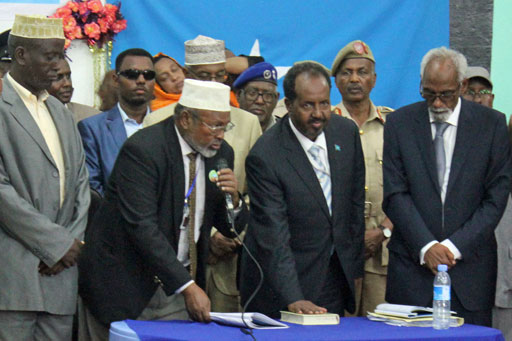
Dhaartii madaxweynaha Soomaaliya Dr. Xassan Sheikh Max'ud.
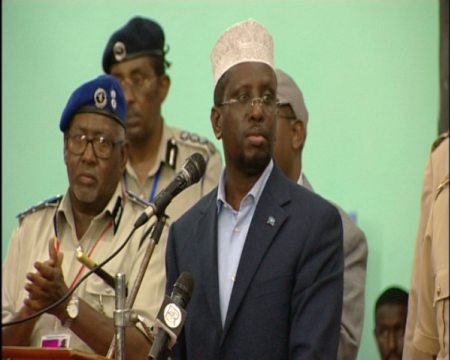
Madaxweyne Sheikh Shariif Sh. Axmed oo ka hadlayay
doorashada madaxweyaha cusub
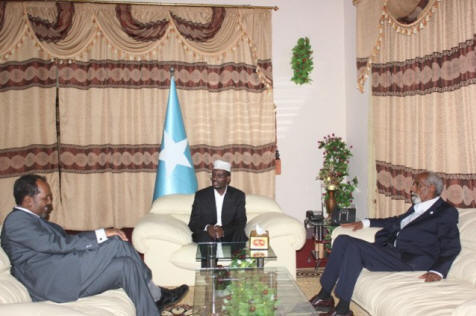
Kulankii ugu horreeyay ee ku dhexmaray madaxtooyada madaxda
Soomaaliya
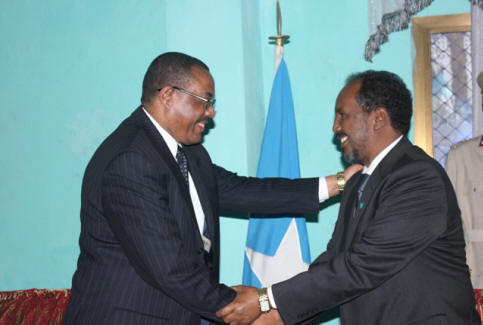
Ra'iisul wasaaraha
Ethiopia Heyle Mariam Deselinge madaxweyne Xassan Sh. Max'ud
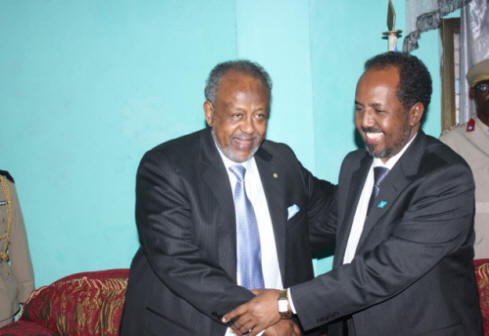
Madaxweyne Djibouti, Ismaaciil Cumar Geelle & madaxweyne
Xassan Sh. Max'ud
|
